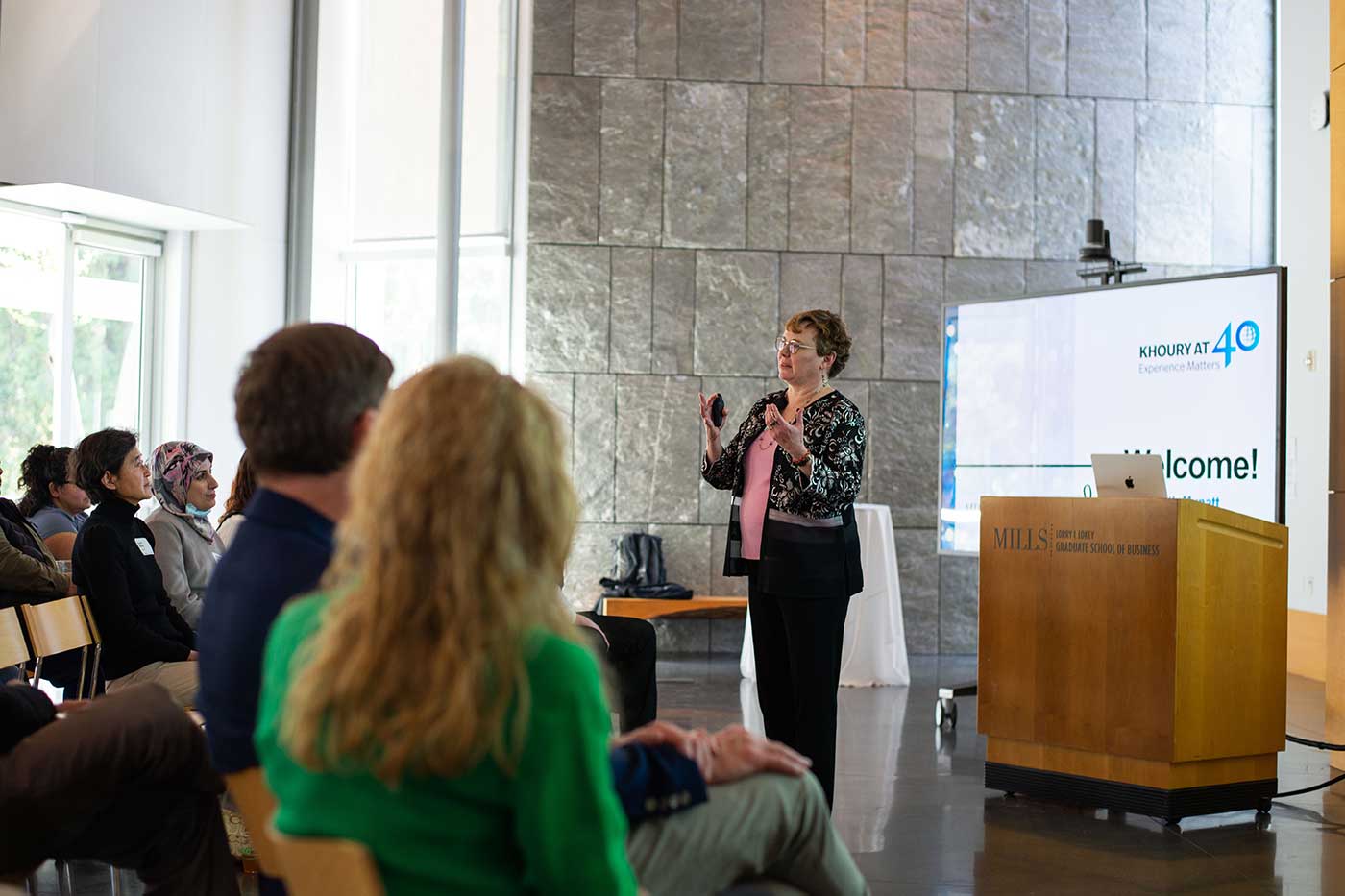40th anniversary events on California campuses celebrate innovative industry partnerships and research
Author: Milton Posner
Date: 05.05.23
 Photo by Josephine Pettigrew.
Photo by Josephine Pettigrew.
This piece is the sixth in a series on Khoury College’s 40th anniversary celebrations, a series that also covers events in Boston, London, Vancouver, Portland, and Seattle.
Given Northern California’s reputation as a hub for technology research and innovation, it should come as no surprise that the California stage of Khoury College’s 40th anniversary tour had three stops to make.
It began on April 15 with a networking reception for alumni at one of Northeastern’s newest additions to its global network, Mills College in Oakland. There, Dean Elizabeth Mynatt reminded the attendees of the role of each Northeastern campus in furthering the college’s learning, research, and inclusion goals.
“The Khoury story is being lived out on these campuses with faculty, students, and staff who are making it their own; that empowerment is fundamental,” Mynatt said. “Our global university system is a foundation and structure that empowers our researchers to have impact. We can impact policy because we’re based in Arlington. We can impact First Nations because of our presence in Vancouver. And now we’re here in Oakland. Other universities don’t know how to do this, but we know, and we’re leveraging our strength.”
Mynatt also cited the responsibility of computing researchers and professionals to society.
“We have an obligation to prepare our students to become leaders in the field, to make them not just technically skilled, but able to wrestle with hard decisions, and with the lack of responsibility taken on by some of the inventors within computer science,” she added. “At the 50th, 60th, or any future anniversary, what will they say about the choices and commitments we’re making today? I think what will matter most is doubling down on our commitment to “computer science for everyone.”
Three days later, the celebration stopped in San Francisco for a faculty and student lunch, where Khoury leaders had the opportunity to interact informally with students pursuing their CS master’s. Then, that night, the Bay Area festivities culminated with a celebration, faculty panel, and student research showcase in San Jose, one also attended by local industry partners.
“What we’ve seen in this 40th experience is that this is not about cookie-cutter Khoury, or about replicating Boston here, there, and yonder,” Mynatt observed. “Every campus has unique strengths because they’re engaged in their local communities and with their own local partners, and they’re bringing their own leadership to the table.”
The college also recognized five local 40 for 40 honorees: Greg Waters, a Khoury alumnus whose first company shared its space with Northeastern’s first Bay Area campus, and whose current company operates out of Northeastern’s Kostas Research Institute in Burlington, MA; Chris Lambert, former chief technical officer at Lyft; Crista Lopes, who helped pioneer aspect-oriented programming research as a Khoury doctoral student and went on to co-develop an award-winning, open-source, 3D virtual world; Praful Mathur, who helped found entrepreneurial student organizations at Northeastern and has founded multiple companies since; and Natasha Noy, an AAAI Fellow who researched at Stanford for 15 years before joining a data-focused Google team.
The event proceeded with a panel of professors John Alexis Guerra Gómez, Jeongkyu Lee, and Ricardo Baeza-Yates, along with alumna and NASA software engineer Aida Sharif Rohani. Among the spotlighted topics were the panel’s desire for students and doctoral researchers to travel seamlessly between campuses for learning and collaboration; they also spoke to the ability of a master’s thesis to instill skills valuable in academia and industry, including thinking critically, running experiments, and embracing uncertainty in one’s work.
“This research involving faculty and master’s students in the network was very different from what many people envisioned when they thought about university research,” said Jodi Tims, associate dean of network programs, professor of the practice, and moderator of the panel.
The evening concluded with a showcase of 18 student research projects all conducted under the guidance of faculty mentors. They included an application to aid in scientific writing, a mechanism for automatically labeling insect legs, and a data pipeline for a music streaming app.
Subscribe to Khoury News
The Khoury Network: Be in the know
Subscribe now to our monthly newsletter for the latest stories and achievements of our students and faculty